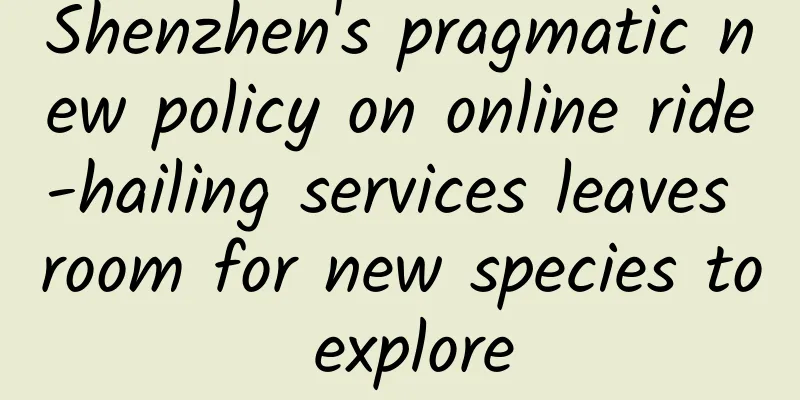How far can a taxi-hailing app that has forgotten its original purpose go?

|
Frankly speaking, I am a loyal user of taxi-hailing apps. I have always been and I agree with their contribution to the integration of taxi resources. If taxi-hailing apps can fully follow the market mechanism, they may really become great Internet products. However, with the intervention of capital, taxi-hailing apps have strayed too far from their original intention. Recently, Didi Taxi has provided a "distance reward service" for taxi drivers, that is, drivers who frequently use Didi Taxi can get priority recommendation from Didi. For example, if the original distance between the passenger and a driver is 500 meters, if the driver is a loyal user of Didi, he will be given a distance of 100-200 meters and will be recommended to the user first. Tiege randomly asked several drivers, and they all didn't understand why Didi could do such a stupid thing. Users use Didi to essentially take the nearest taxi, and drivers also hope to pick up the nearest and suitable passenger. Didi's "distance reward" is an artificial interference with the judgment of both parties, which has obviously deviated from its vision of reasonably allocating rental resources at the beginning of its business, and has completely become a slave to a series of KPIs such as opening rate and usage rate pursued by capital. There are always more bizarre incidents in taxi-hailing apps. Recently, the taxi-hailing app launched a "group purchase" policy for drivers, that is, if the taxi driver grabs a certain number of orders every day, he will receive a cash reward from the platform. We have seen that after the taxi-hailing app stopped subsidizing, the drivers' motivation to use the app has been decreasing, and the platform no longer cares about the past vision, and does not seek future development but only superficial prosperity. In fact, since the beginning of the capital intervention, taxi-hailing software, which could have changed the industry, was destined to become a mobile tool for giants. With the help of taxi-hailing software, Alibaba and Tencent have basically realized their mobile and mobile payment market layout. Previously, the giants did not have many purely mobile products, but more of a simple mobile version of PC products. Taxi-hailing software is one of the few products born under a completely mobile situation, which is also the main reason why the giants chose taxi-hailing software. As we see the continuous improvement of Alibaba and Tencent's mobile layout, taxi-hailing software has gradually completed its historical mission and become useless. As a result, we saw that the taxi-hailing app was basically in obscurity in the second half of the year. Occasionally, there was news about name changes, but the market response was still lukewarm. Subsidies are like Viagra to taxi apps. Although they have bright data in the short term, once subsidies are lost, everyone from passengers to taxi drivers will be disappointed. As a result, the usage rate of taxi apps has plummeted, and we can see that the platform has adopted "distance rewards" and "group buying strategies" at all costs. The fundamental purpose is to use small-scale rewards to recover the decline in data without much capital intervention, even at the expense of user experience. For taxi apps, the most important user experience is the accuracy of positioning. However, Tiege and many drivers reported that the positioning accuracy of taxi apps is a mess. The most interesting thing is that Tiege is already sitting in the taxi, but the taxi app still shows that there is still a distance of 1,000 meters. The premise is of course that the mobile phone positioning function is turned on and the signal is good. Tiege and the driver can only smile helplessly. The inaccuracy of positioning also lies in the fact that it only calculates the straight-line distance. When drivers are not familiar with the road conditions, they often mistake the straight-line distance reported by the platform as the actual driving distance. As a result, they have to go around a lot to pick up passengers, which consumes too much time in the middle. Otherwise, they will suggest that passengers cancel the order. The result is that reasonable passengers understand, and there are also complaints. Under the premise that taxi-hailing apps have become or will become a daily necessity for people, and that capital has wiped out many platforms that did not have a godfather, the only thing that remains is to work hard on improving user experience to win the market. However, what we see is that the platform side harms the user experience for the sake of short-term numbers, which is really heartbreaking. The taxi-hailing software is undoubtedly too impatient. It is eager to connect to the private car business and distribute a large number of private car cash coupons. The result is that taxi drivers who are already suspicious of the platform have even less trust in the platform, and it is understandable that Nanjing taxi drivers uninstalled the taxi-hailing software in protest. Although the platforms deny that the private car service has no impact on taxis, Tie Ge and many users still use the private car coupons given by the platform to enjoy the private car service, and a considerable part of this business originally belongs to the taxi drivers. The taxi-hailing software can't wait to launch the private car service, and it still hopes that the commission business of the private car service can achieve profitability as soon as possible, which is obviously a bit hasty. Without fully gaining the trust of taxi drivers, the private car service will obviously be rejected or even resisted by the drivers. If the taxi app platforms still remember their ideals in the early days of their business, it is recommended that you review them. Working for an ideal is better than working for a KPI, and a KPI without an ideal is just as brilliant as fireworks, which is fleeting. As a winner of Toutiao's Qingyun Plan and Baijiahao's Bai+ Plan, the 2019 Baidu Digital Author of the Year, the Baijiahao's Most Popular Author in the Technology Field, the 2019 Sogou Technology and Culture Author, and the 2021 Baijiahao Quarterly Influential Creator, he has won many awards, including the 2013 Sohu Best Industry Media Person, the 2015 China New Media Entrepreneurship Competition Beijing Third Place, the 2015 Guangmang Experience Award, the 2015 China New Media Entrepreneurship Competition Finals Third Place, and the 2018 Baidu Dynamic Annual Powerful Celebrity. |
<<: Virtual operator Xiaomi may not make any big moves within a year
>>: Ban Kuaidi? The conflict between Alibaba and Tencent intensifies again
Recommend
How Chinese programmers get Facebook offers
Preface In October 2014, I was fortunate enough t...
Luxury cars have quality problems again. Why is Lexus frequently recalling them?
Recently, the General Administration of Quality S...
Microsoft: 7 reasons why you will love Win10
Although some major companies are missing from th...
Two key points for Kuaishou promotion and traffic generation!
Kuaishou started to build an education vertical c...
Android 13 Wait a little longer, the next Android version will be Android 12.1
September 9 news Google has launched multiple dev...
If you often have these 5 thoughts, it means you are wasting yourself! Please stop immediately
Have you ever wondered why you sometimes make som...
Why didn't a larger iPad appear this year?
In the early morning of October 17th, Beijing tim...
They studied anal breathing in mammals not to win an Ig Nobel Prize, but to save lives
Produced by: Science Popularization China Author:...
Smartisan T2 review: Still unique, but not as nostalgic
No one would have expected that the battle in the...
Joint life span is only 60 years? Stop now! These habits make your knees age faster
Experts in this article: Yu Tong, Associate Chief...
The price of hairy crabs has dropped! Will we finally have the freedom to eat crabs?
It’s crab time again. For all you “crab lovers”, ...
Is the FOTILE refrigeration hood and cooking center, which costs 28,980 yuan, leading a real trend or creating false demand?
On the evening of August 12, Fotile, a veteran co...
Cool Money Taobao Blue Ocean paid articles
Introduction to the paid articles resources of Ku...
[Creative Cultivation Program] Why don’t you spit out the grape skins when eating grapes?
Author: Lao Ke opens his mind Audit: Superb There...









